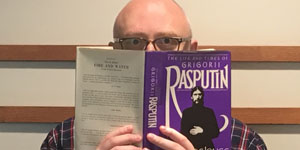
Alex DeJonge’s “The Life and Times of Grigorii Rasputin” offers up a fascinating glimpse into the life and times of one of the twentieth century’s greatest enigmas, the so-called “Mad Monk” Grigorii Rasputin. DeJong’s work leads us through Grigori Yefimovich Rasputin’s life, beginning with his childhood in rural Siberia, a bleak landscape that was saturated with a strange mix of archaic regional religions and superstitions, poverty and inescapable despair. The book follows the young Rasputin’s life, from binge-drinking horse thief to one of the millions of wandering vagabonds that roamed the Russian countryside, eventually finding a reputation as a starets, a charismatic spiritual ascetic. It was in this role that Rasputin eventually climbed the social ladder of Russian society, finding his way into the inner sanctums of Tsarkoe Selo and eventually becoming a trusted advisor and confidant to the Tsar and Tsarina during a period of turmoil that would culminate in the fall of the Russian dynasty. Alongside the biographical information DeJonge also explores the history and socio-political landscape of Russia during Rasputin’s life, giving a solid understanding of the myriad of complexities that led to the ultimate fall of the Russian empire. The author also examines some of the more legendary aspects of Rasputin’s character, namely rumors of the starets possessing “second sight” to prophesize events and his uncanny abilities to alleviate the young Tsarevich Alexei’s haemophilia, providing a well-documented and enjoyable read that leaves us to form our own conclusions surrounding “the mystery of the history”.

